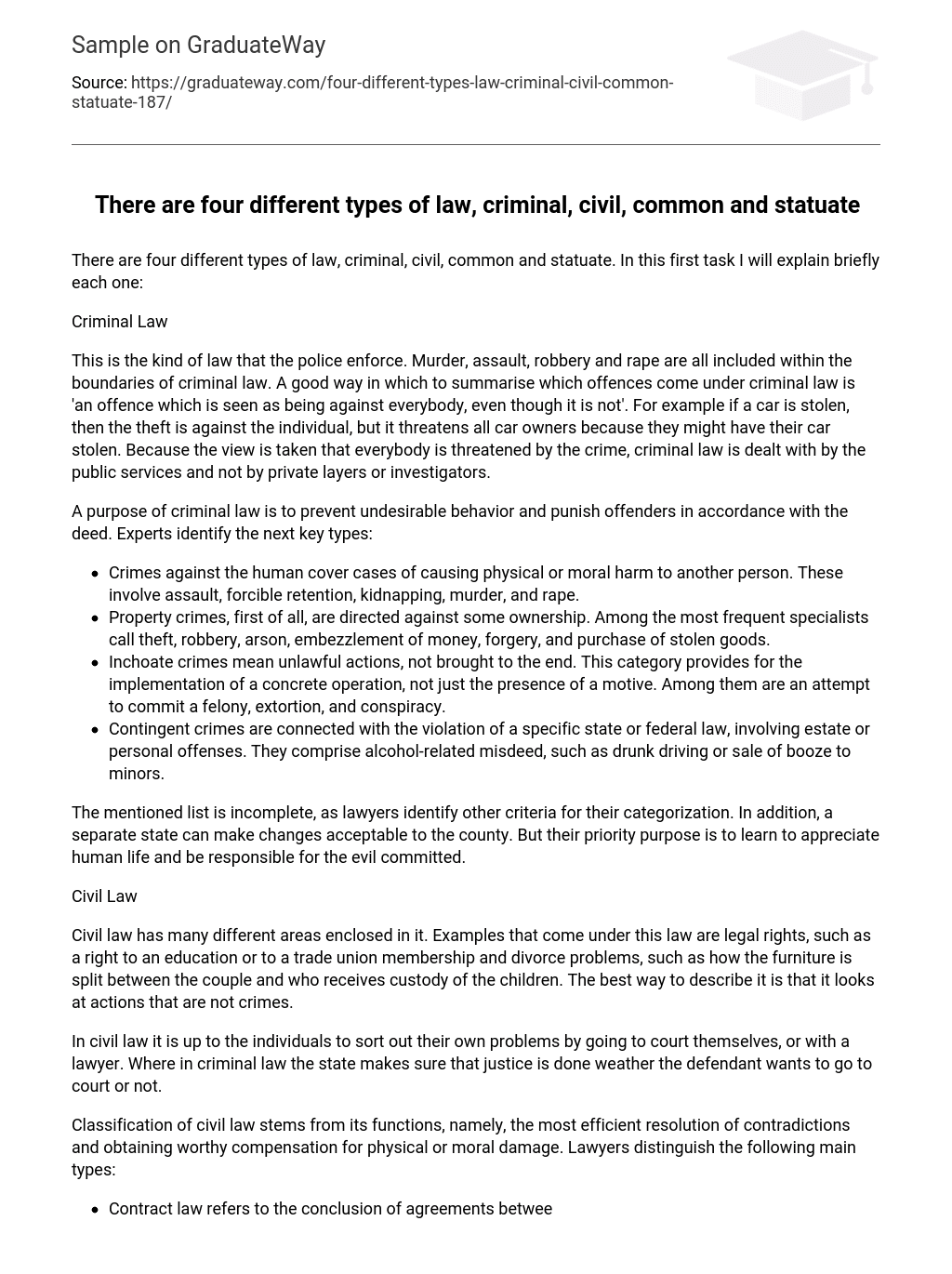Criminal Law
This is the kind of law that the police enforce. Murder, assault, robbery and rape are all included within the boundaries of criminal law. A good way in which to summarise which offences come under criminal law is ‘an offence which is seen as being against everybody, even though it is not’. For example if a car is stolen, then the theft is against the individual, but it threatens all car owners because they might have their car stolen. Because the view is taken that everybody is threatened by the crime, criminal law is dealt with by the public services and not by private layers or investigators.
A purpose of criminal law is to prevent undesirable behavior and punish offenders in accordance with the deed. Experts identify the next key types:
- Crimes against the human cover cases of causing physical or moral harm to another person. These involve assault, forcible retention, kidnapping, murder, and rape.
- Property crimes, first of all, are directed against some ownership. Among the most frequent specialists call theft, robbery, arson, embezzlement of money, forgery, and purchase of stolen goods.
- Inchoate crimes mean unlawful actions, not brought to the end. This category provides for the implementation of a concrete operation, not just the presence of a motive. Among them are an attempt to commit a felony, extortion, and conspiracy.
- Contingent crimes are connected with the violation of a specific state or federal law, involving estate or personal offenses. They comprise alcohol-related misdeed, such as drunk driving or sale of booze to minors.
The mentioned list is incomplete, as lawyers identify other criteria for their categorization. In addition, a separate state can make changes acceptable to the county. But their priority purpose is to learn to appreciate human life and be responsible for the evil committed.
Civil Law
Civil law has many different areas enclosed in it. Examples that come under this law are legal rights, such as a right to an education or to a trade union membership and divorce problems, such as how the furniture is split between the couple and who receives custody of the children. The best way to describe it is that it looks at actions that are not crimes.
In civil law it is up to the individuals to sort out their own problems by going to court themselves, or with a lawyer. Where in criminal law the state makes sure that justice is done weather the defendant wants to go to court or not.
Classification of civil law stems from its functions, namely, the most efficient resolution of contradictions and obtaining worthy compensation for physical or moral damage. Lawyers distinguish the following main types:
- Contract law refers to the conclusion of agreements between two or more participants. At the same time, each of them is obliged to observe the obligations assumed. If any clause of the treaty is violated, a civil aspect is to be drawn up.
- Tort law is a category that considers cases of personal injury and other civil offenses. The first one includes physical mayhems or material loss. Among the reasons experts name negligence, willful action and strict responsibility, related to the need to provide absolute security to outsiders.
- Property law takes care of matters related to real estate or personal assets. As the latter, it can be considered tangible things, such as jewelry, and intangible, for example, copyrights or securities.
- Family law deals with issues of marriage or divorce, custody of children, adoption problems and other nuances of relations. The court takes an active part in the distribution of finances after dissolution of marriage union and establishment of guardianship over kids. In recent years, new branches of functioning have appeared, such as same-sex marriages, surrogate motherhood, and artificial insemination.
Common Law and Precedent
Common law is based on felling about right and wrong, which we all have. It is common law that tells us that people are more important than things. So a crime committed against a person is looked upon far worse that a crime committed against property.
Precedent means ‘what has gone before’. So if a judge is trying a murder case, he or she will try to look up similar cases that have gone before, to see how they were dealt with and what sentence was given. It is very important when carrying out common law.
Statuate law
A statuate law is a law that is made by the government. In England all laws are mainly made by parliament. These laws are written down from start to finish, and therefore different to common laws which are not written down. All new laws are statuate laws even though some are based on common laws, which have gone before.
This is because as times change the old common laws start to form holes in which new age crimes can slip through. A good example of this is the data protection act of 1998; this statuate law was based on the common law idea that everybody has a right to privacy. This new statuate law had to be brought out because of the problems caused by information technology, and the fact that individuals personal details like bank numbers and health records could be passed for computer to computer.





